Health and Social Care Report: Principles, Policies, and Impact
VerifiedAdded on 2020/02/05
|12
|2131
|41
Report
AI Summary
This report delves into the fundamental principles of health and social care, emphasizing the importance of quality care and patient well-being. It examines the application of these principles within the SCIE (Social Care Institute for Excellence) setting, addressing ethical dilemmas faced by care providers. The report further analyzes the impact of governmental frameworks, legislation (such as the Equality Act 2010 and Health and Safety Act), and codes of practice on service delivery, including the implementation of a whistleblowing policy. The conclusion highlights the significance of these principles and policies in delivering effective and ethical healthcare services, referencing the importance of maintaining privacy, confidentiality, and dignity. The report also provides an overview of relevant books and journals.
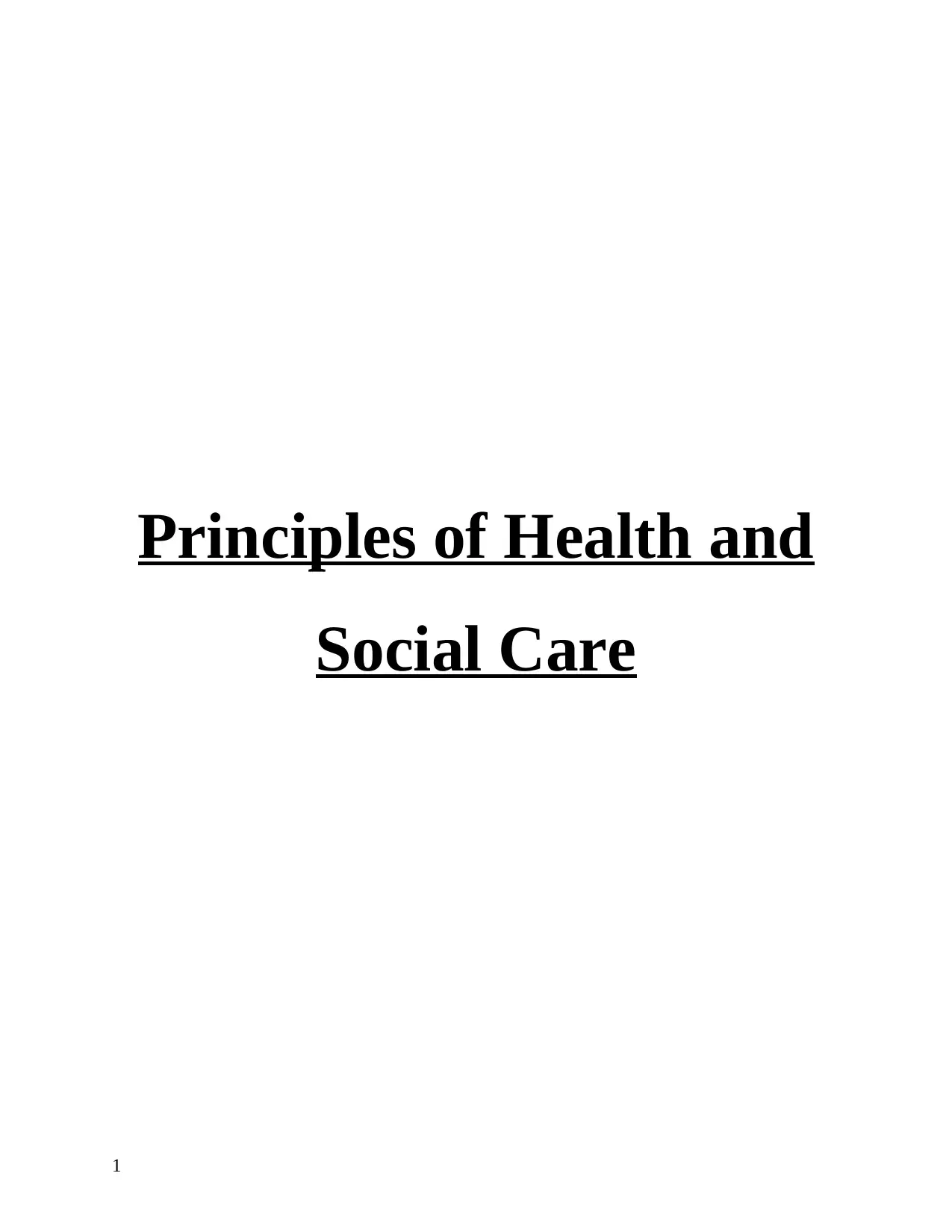
Principles of Health and
Social Care
1
Social Care
1
Paraphrase This Document
Need a fresh take? Get an instant paraphrase of this document with our AI Paraphraser

2
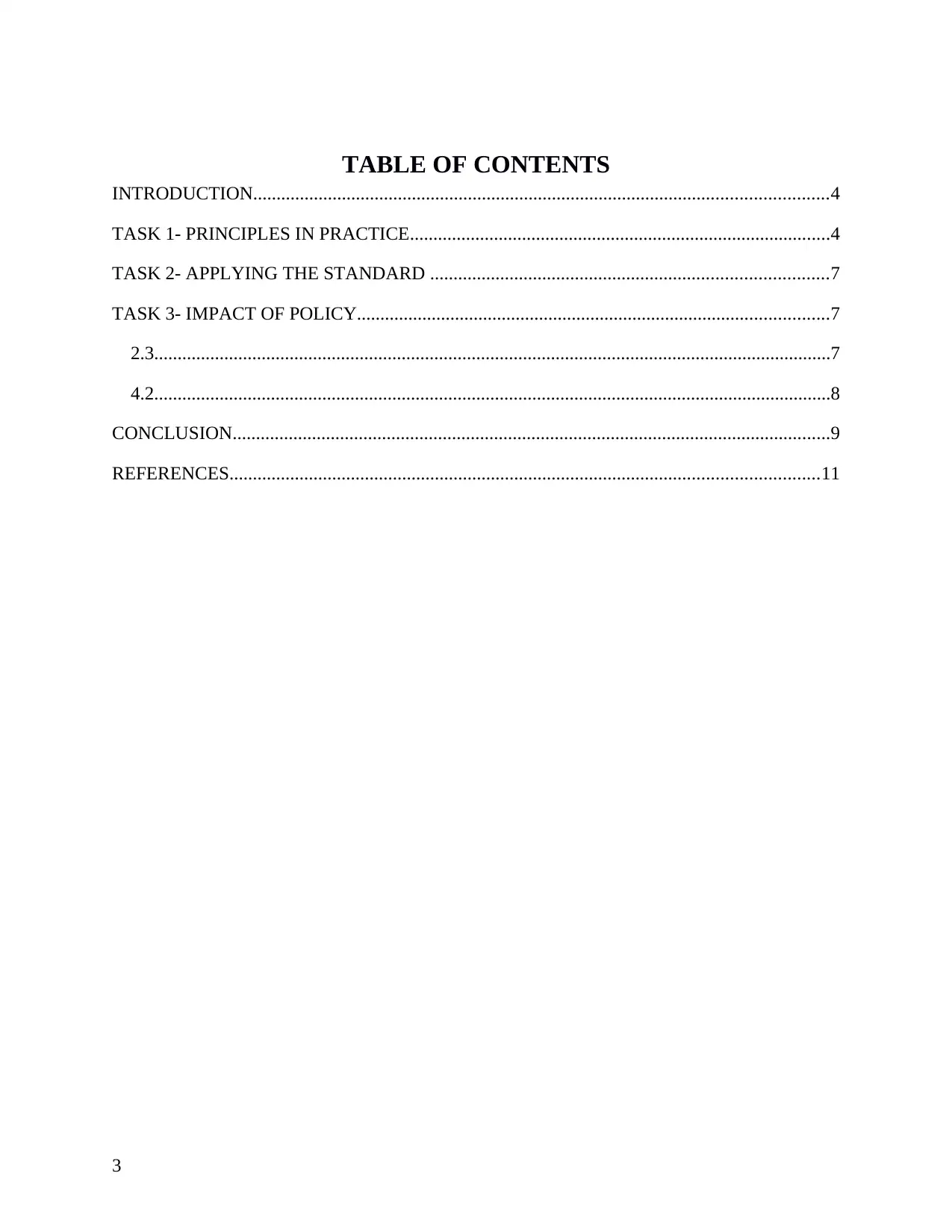
TABLE OF CONTENTS
INTRODUCTION...........................................................................................................................4
TASK 1- PRINCIPLES IN PRACTICE..........................................................................................4
TASK 2- APPLYING THE STANDARD .....................................................................................7
TASK 3- IMPACT OF POLICY.....................................................................................................7
2.3.................................................................................................................................................7
4.2.................................................................................................................................................8
CONCLUSION................................................................................................................................9
REFERENCES..............................................................................................................................11
3
INTRODUCTION...........................................................................................................................4
TASK 1- PRINCIPLES IN PRACTICE..........................................................................................4
TASK 2- APPLYING THE STANDARD .....................................................................................7
TASK 3- IMPACT OF POLICY.....................................................................................................7
2.3.................................................................................................................................................7
4.2.................................................................................................................................................8
CONCLUSION................................................................................................................................9
REFERENCES..............................................................................................................................11
3
⊘ This is a preview!⊘
Do you want full access?
Subscribe today to unlock all pages.

Trusted by 1+ million students worldwide
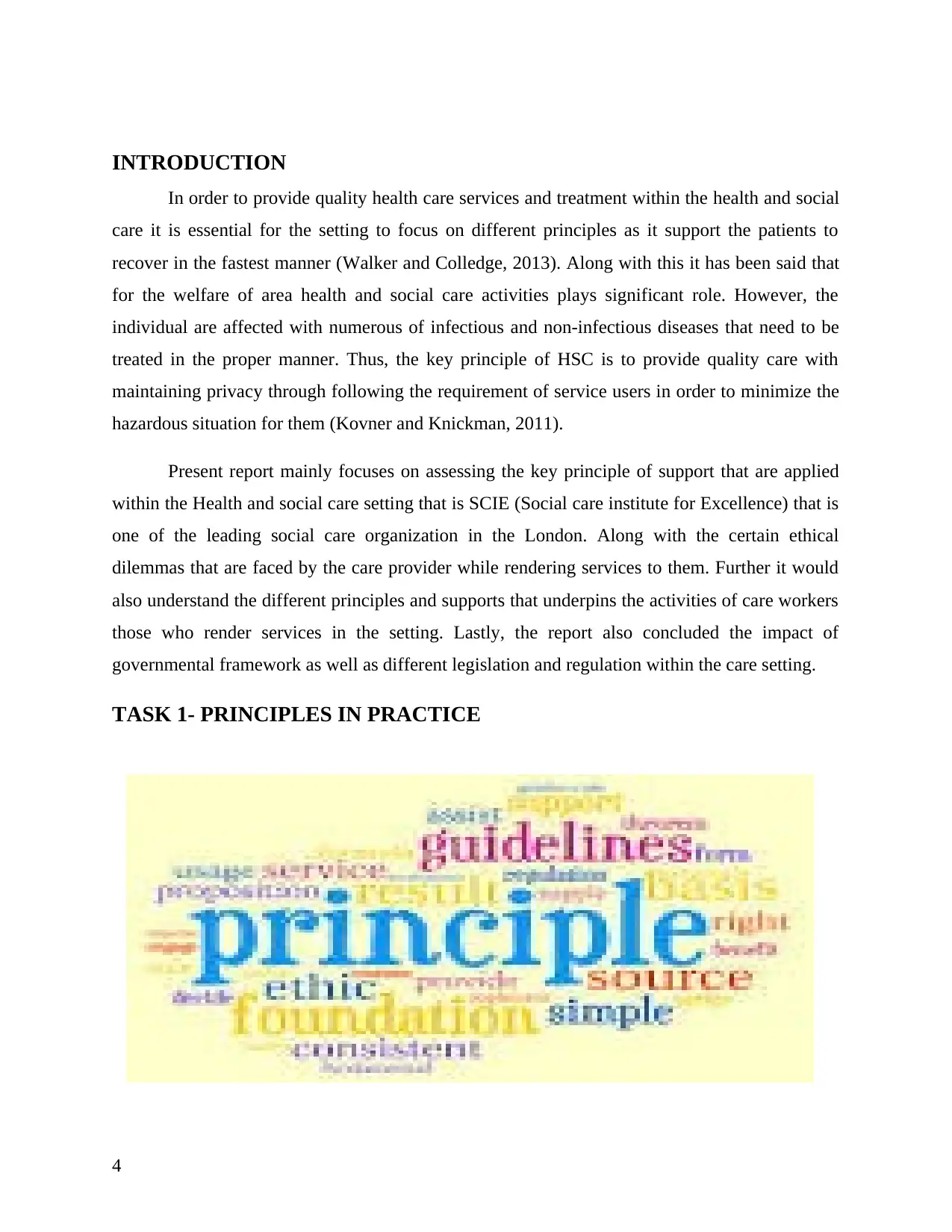
INTRODUCTION
In order to provide quality health care services and treatment within the health and social
care it is essential for the setting to focus on different principles as it support the patients to
recover in the fastest manner (Walker and Colledge, 2013). Along with this it has been said that
for the welfare of area health and social care activities plays significant role. However, the
individual are affected with numerous of infectious and non-infectious diseases that need to be
treated in the proper manner. Thus, the key principle of HSC is to provide quality care with
maintaining privacy through following the requirement of service users in order to minimize the
hazardous situation for them (Kovner and Knickman, 2011).
Present report mainly focuses on assessing the key principle of support that are applied
within the Health and social care setting that is SCIE (Social care institute for Excellence) that is
one of the leading social care organization in the London. Along with the certain ethical
dilemmas that are faced by the care provider while rendering services to them. Further it would
also understand the different principles and supports that underpins the activities of care workers
those who render services in the setting. Lastly, the report also concluded the impact of
governmental framework as well as different legislation and regulation within the care setting.
TASK 1- PRINCIPLES IN PRACTICE
4
In order to provide quality health care services and treatment within the health and social
care it is essential for the setting to focus on different principles as it support the patients to
recover in the fastest manner (Walker and Colledge, 2013). Along with this it has been said that
for the welfare of area health and social care activities plays significant role. However, the
individual are affected with numerous of infectious and non-infectious diseases that need to be
treated in the proper manner. Thus, the key principle of HSC is to provide quality care with
maintaining privacy through following the requirement of service users in order to minimize the
hazardous situation for them (Kovner and Knickman, 2011).
Present report mainly focuses on assessing the key principle of support that are applied
within the Health and social care setting that is SCIE (Social care institute for Excellence) that is
one of the leading social care organization in the London. Along with the certain ethical
dilemmas that are faced by the care provider while rendering services to them. Further it would
also understand the different principles and supports that underpins the activities of care workers
those who render services in the setting. Lastly, the report also concluded the impact of
governmental framework as well as different legislation and regulation within the care setting.
TASK 1- PRINCIPLES IN PRACTICE
4
Paraphrase This Document
Need a fresh take? Get an instant paraphrase of this document with our AI Paraphraser

5

6
⊘ This is a preview!⊘
Do you want full access?
Subscribe today to unlock all pages.

Trusted by 1+ million students worldwide
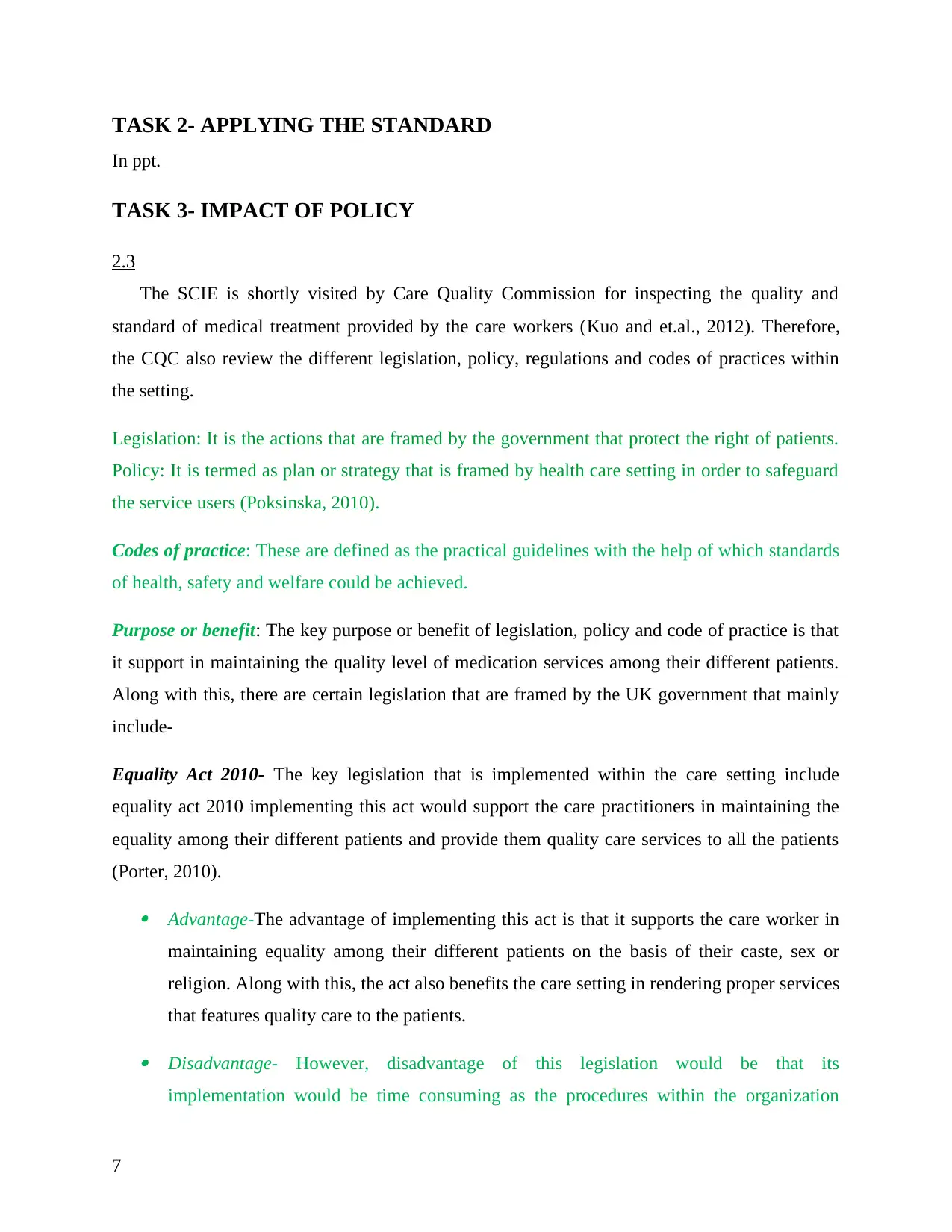
TASK 2- APPLYING THE STANDARD
In ppt.
TASK 3- IMPACT OF POLICY
2.3
The SCIE is shortly visited by Care Quality Commission for inspecting the quality and
standard of medical treatment provided by the care workers (Kuo and et.al., 2012). Therefore,
the CQC also review the different legislation, policy, regulations and codes of practices within
the setting.
Legislation: It is the actions that are framed by the government that protect the right of patients.
Policy: It is termed as plan or strategy that is framed by health care setting in order to safeguard
the service users (Poksinska, 2010).
Codes of practice: These are defined as the practical guidelines with the help of which standards
of health, safety and welfare could be achieved.
Purpose or benefit: The key purpose or benefit of legislation, policy and code of practice is that
it support in maintaining the quality level of medication services among their different patients.
Along with this, there are certain legislation that are framed by the UK government that mainly
include-
Equality Act 2010- The key legislation that is implemented within the care setting include
equality act 2010 implementing this act would support the care practitioners in maintaining the
equality among their different patients and provide them quality care services to all the patients
(Porter, 2010).
Advantage-The advantage of implementing this act is that it supports the care worker in
maintaining equality among their different patients on the basis of their caste, sex or
religion. Along with this, the act also benefits the care setting in rendering proper services
that features quality care to the patients.
Disadvantage- However, disadvantage of this legislation would be that its
implementation would be time consuming as the procedures within the organization
7
In ppt.
TASK 3- IMPACT OF POLICY
2.3
The SCIE is shortly visited by Care Quality Commission for inspecting the quality and
standard of medical treatment provided by the care workers (Kuo and et.al., 2012). Therefore,
the CQC also review the different legislation, policy, regulations and codes of practices within
the setting.
Legislation: It is the actions that are framed by the government that protect the right of patients.
Policy: It is termed as plan or strategy that is framed by health care setting in order to safeguard
the service users (Poksinska, 2010).
Codes of practice: These are defined as the practical guidelines with the help of which standards
of health, safety and welfare could be achieved.
Purpose or benefit: The key purpose or benefit of legislation, policy and code of practice is that
it support in maintaining the quality level of medication services among their different patients.
Along with this, there are certain legislation that are framed by the UK government that mainly
include-
Equality Act 2010- The key legislation that is implemented within the care setting include
equality act 2010 implementing this act would support the care practitioners in maintaining the
equality among their different patients and provide them quality care services to all the patients
(Porter, 2010).
Advantage-The advantage of implementing this act is that it supports the care worker in
maintaining equality among their different patients on the basis of their caste, sex or
religion. Along with this, the act also benefits the care setting in rendering proper services
that features quality care to the patients.
Disadvantage- However, disadvantage of this legislation would be that its
implementation would be time consuming as the procedures within the organization
7
Paraphrase This Document
Need a fresh take? Get an instant paraphrase of this document with our AI Paraphraser
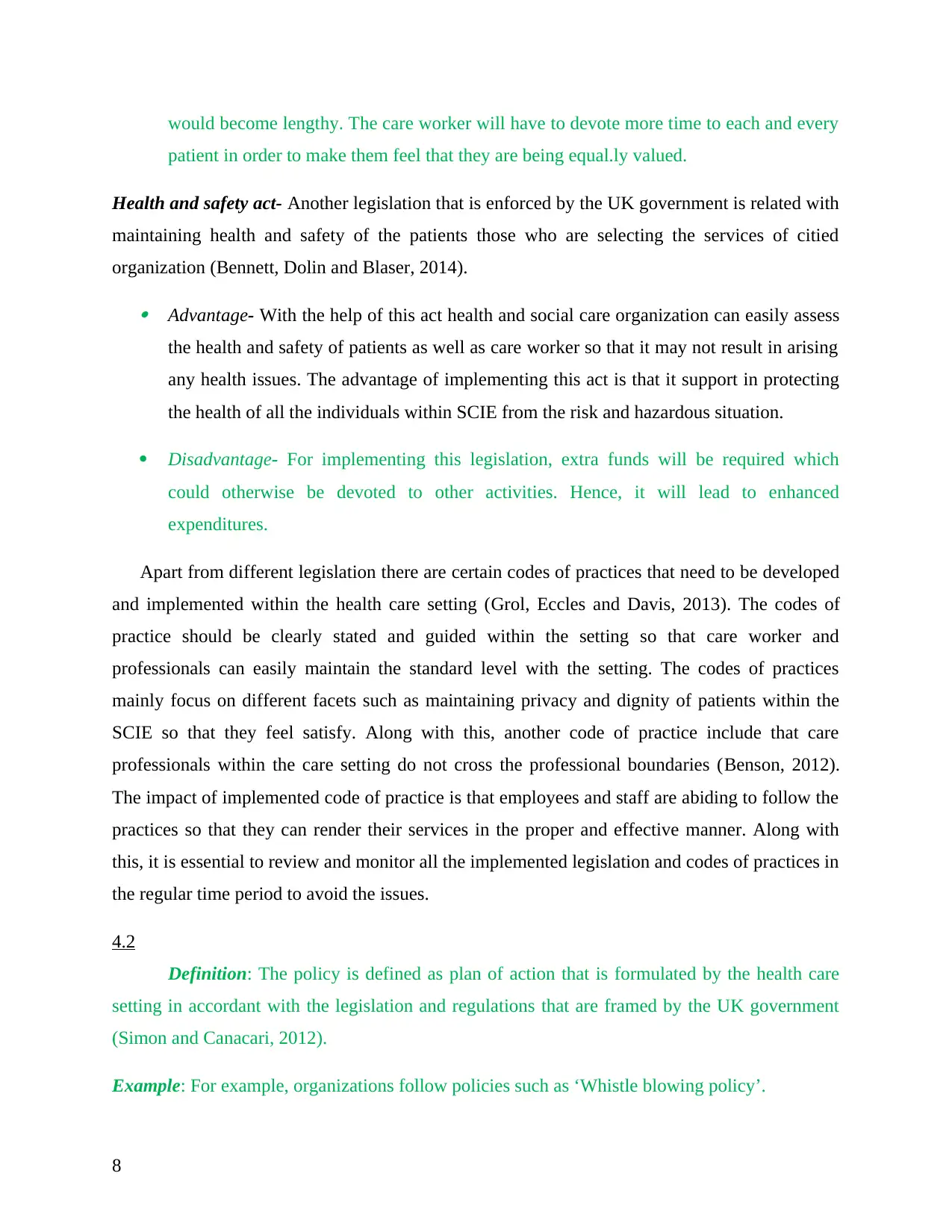
would become lengthy. The care worker will have to devote more time to each and every
patient in order to make them feel that they are being equal.ly valued.
Health and safety act- Another legislation that is enforced by the UK government is related with
maintaining health and safety of the patients those who are selecting the services of citied
organization (Bennett, Dolin and Blaser, 2014).
Advantage- With the help of this act health and social care organization can easily assess
the health and safety of patients as well as care worker so that it may not result in arising
any health issues. The advantage of implementing this act is that it support in protecting
the health of all the individuals within SCIE from the risk and hazardous situation.
Disadvantage- For implementing this legislation, extra funds will be required which
could otherwise be devoted to other activities. Hence, it will lead to enhanced
expenditures.
Apart from different legislation there are certain codes of practices that need to be developed
and implemented within the health care setting (Grol, Eccles and Davis, 2013). The codes of
practice should be clearly stated and guided within the setting so that care worker and
professionals can easily maintain the standard level with the setting. The codes of practices
mainly focus on different facets such as maintaining privacy and dignity of patients within the
SCIE so that they feel satisfy. Along with this, another code of practice include that care
professionals within the care setting do not cross the professional boundaries (Benson, 2012).
The impact of implemented code of practice is that employees and staff are abiding to follow the
practices so that they can render their services in the proper and effective manner. Along with
this, it is essential to review and monitor all the implemented legislation and codes of practices in
the regular time period to avoid the issues.
4.2
Definition: The policy is defined as plan of action that is formulated by the health care
setting in accordant with the legislation and regulations that are framed by the UK government
(Simon and Canacari, 2012).
Example: For example, organizations follow policies such as ‘Whistle blowing policy’.
8
patient in order to make them feel that they are being equal.ly valued.
Health and safety act- Another legislation that is enforced by the UK government is related with
maintaining health and safety of the patients those who are selecting the services of citied
organization (Bennett, Dolin and Blaser, 2014).
Advantage- With the help of this act health and social care organization can easily assess
the health and safety of patients as well as care worker so that it may not result in arising
any health issues. The advantage of implementing this act is that it support in protecting
the health of all the individuals within SCIE from the risk and hazardous situation.
Disadvantage- For implementing this legislation, extra funds will be required which
could otherwise be devoted to other activities. Hence, it will lead to enhanced
expenditures.
Apart from different legislation there are certain codes of practices that need to be developed
and implemented within the health care setting (Grol, Eccles and Davis, 2013). The codes of
practice should be clearly stated and guided within the setting so that care worker and
professionals can easily maintain the standard level with the setting. The codes of practices
mainly focus on different facets such as maintaining privacy and dignity of patients within the
SCIE so that they feel satisfy. Along with this, another code of practice include that care
professionals within the care setting do not cross the professional boundaries (Benson, 2012).
The impact of implemented code of practice is that employees and staff are abiding to follow the
practices so that they can render their services in the proper and effective manner. Along with
this, it is essential to review and monitor all the implemented legislation and codes of practices in
the regular time period to avoid the issues.
4.2
Definition: The policy is defined as plan of action that is formulated by the health care
setting in accordant with the legislation and regulations that are framed by the UK government
(Simon and Canacari, 2012).
Example: For example, organizations follow policies such as ‘Whistle blowing policy’.
8
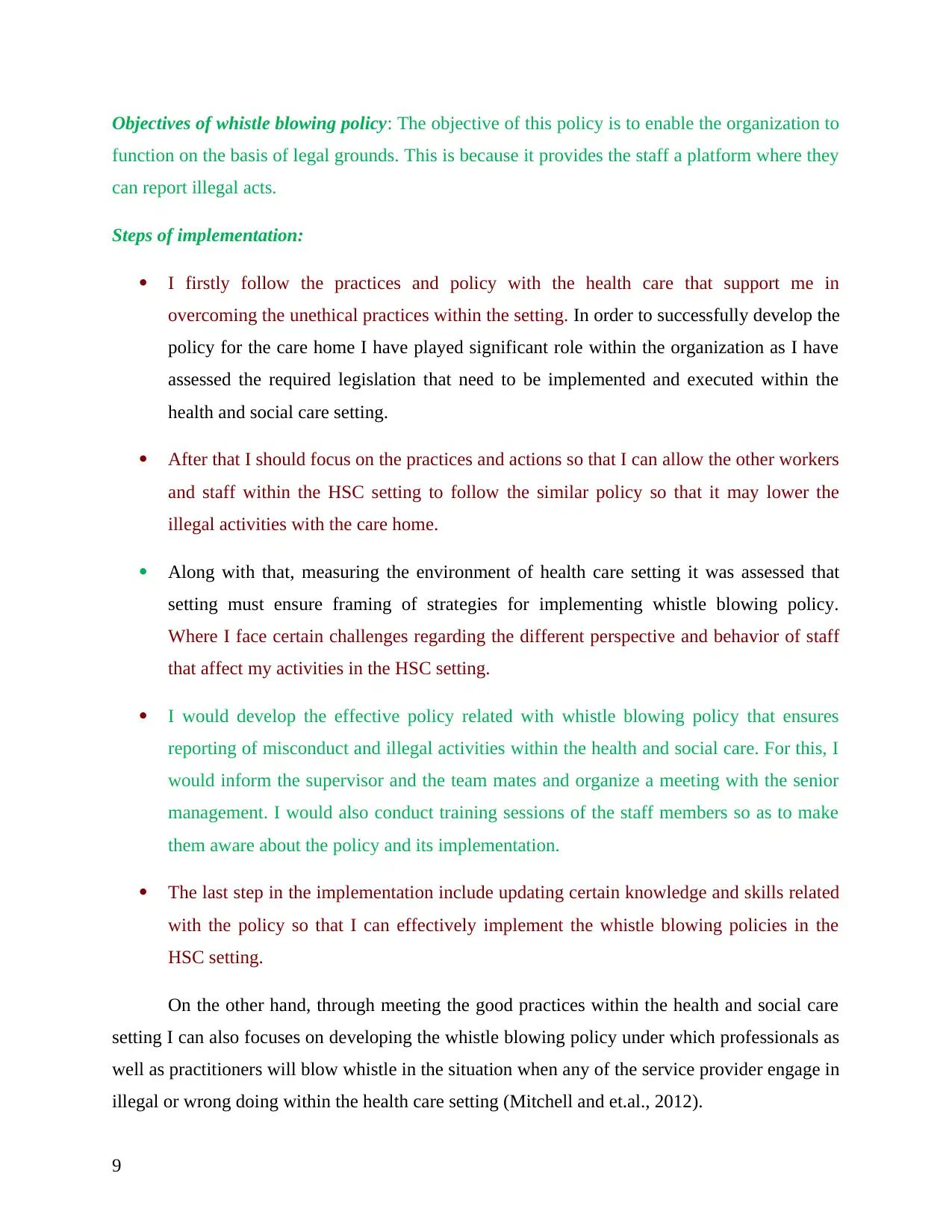
Objectives of whistle blowing policy: The objective of this policy is to enable the organization to
function on the basis of legal grounds. This is because it provides the staff a platform where they
can report illegal acts.
Steps of implementation:
I firstly follow the practices and policy with the health care that support me in
overcoming the unethical practices within the setting. In order to successfully develop the
policy for the care home I have played significant role within the organization as I have
assessed the required legislation that need to be implemented and executed within the
health and social care setting.
After that I should focus on the practices and actions so that I can allow the other workers
and staff within the HSC setting to follow the similar policy so that it may lower the
illegal activities with the care home.
Along with that, measuring the environment of health care setting it was assessed that
setting must ensure framing of strategies for implementing whistle blowing policy.
Where I face certain challenges regarding the different perspective and behavior of staff
that affect my activities in the HSC setting.
I would develop the effective policy related with whistle blowing policy that ensures
reporting of misconduct and illegal activities within the health and social care. For this, I
would inform the supervisor and the team mates and organize a meeting with the senior
management. I would also conduct training sessions of the staff members so as to make
them aware about the policy and its implementation.
The last step in the implementation include updating certain knowledge and skills related
with the policy so that I can effectively implement the whistle blowing policies in the
HSC setting.
On the other hand, through meeting the good practices within the health and social care
setting I can also focuses on developing the whistle blowing policy under which professionals as
well as practitioners will blow whistle in the situation when any of the service provider engage in
illegal or wrong doing within the health care setting (Mitchell and et.al., 2012).
9
function on the basis of legal grounds. This is because it provides the staff a platform where they
can report illegal acts.
Steps of implementation:
I firstly follow the practices and policy with the health care that support me in
overcoming the unethical practices within the setting. In order to successfully develop the
policy for the care home I have played significant role within the organization as I have
assessed the required legislation that need to be implemented and executed within the
health and social care setting.
After that I should focus on the practices and actions so that I can allow the other workers
and staff within the HSC setting to follow the similar policy so that it may lower the
illegal activities with the care home.
Along with that, measuring the environment of health care setting it was assessed that
setting must ensure framing of strategies for implementing whistle blowing policy.
Where I face certain challenges regarding the different perspective and behavior of staff
that affect my activities in the HSC setting.
I would develop the effective policy related with whistle blowing policy that ensures
reporting of misconduct and illegal activities within the health and social care. For this, I
would inform the supervisor and the team mates and organize a meeting with the senior
management. I would also conduct training sessions of the staff members so as to make
them aware about the policy and its implementation.
The last step in the implementation include updating certain knowledge and skills related
with the policy so that I can effectively implement the whistle blowing policies in the
HSC setting.
On the other hand, through meeting the good practices within the health and social care
setting I can also focuses on developing the whistle blowing policy under which professionals as
well as practitioners will blow whistle in the situation when any of the service provider engage in
illegal or wrong doing within the health care setting (Mitchell and et.al., 2012).
9
⊘ This is a preview!⊘
Do you want full access?
Subscribe today to unlock all pages.

Trusted by 1+ million students worldwide
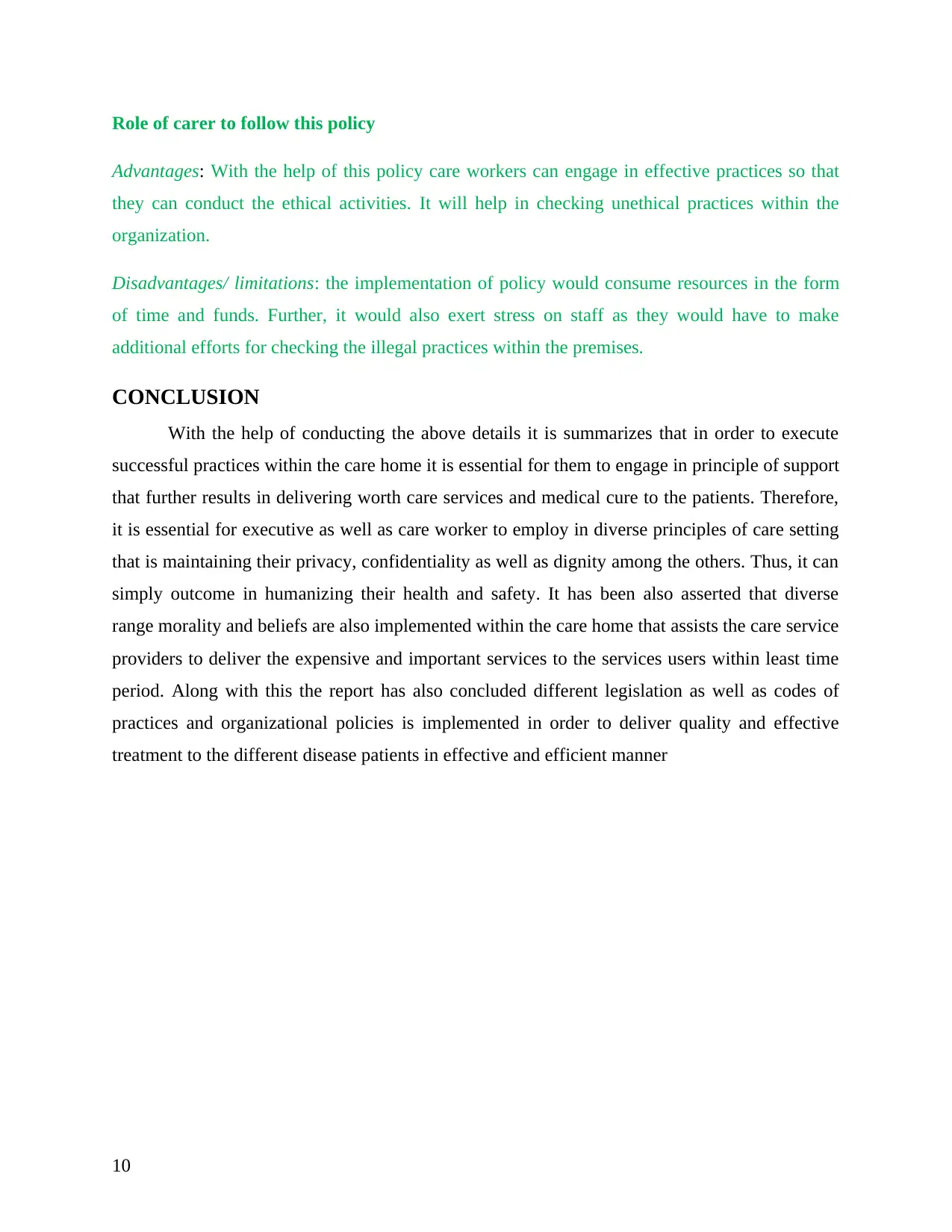
Role of carer to follow this policy
Advantages: With the help of this policy care workers can engage in effective practices so that
they can conduct the ethical activities. It will help in checking unethical practices within the
organization.
Disadvantages/ limitations: the implementation of policy would consume resources in the form
of time and funds. Further, it would also exert stress on staff as they would have to make
additional efforts for checking the illegal practices within the premises.
CONCLUSION
With the help of conducting the above details it is summarizes that in order to execute
successful practices within the care home it is essential for them to engage in principle of support
that further results in delivering worth care services and medical cure to the patients. Therefore,
it is essential for executive as well as care worker to employ in diverse principles of care setting
that is maintaining their privacy, confidentiality as well as dignity among the others. Thus, it can
simply outcome in humanizing their health and safety. It has been also asserted that diverse
range morality and beliefs are also implemented within the care home that assists the care service
providers to deliver the expensive and important services to the services users within least time
period. Along with this the report has also concluded different legislation as well as codes of
practices and organizational policies is implemented in order to deliver quality and effective
treatment to the different disease patients in effective and efficient manner
10
Advantages: With the help of this policy care workers can engage in effective practices so that
they can conduct the ethical activities. It will help in checking unethical practices within the
organization.
Disadvantages/ limitations: the implementation of policy would consume resources in the form
of time and funds. Further, it would also exert stress on staff as they would have to make
additional efforts for checking the illegal practices within the premises.
CONCLUSION
With the help of conducting the above details it is summarizes that in order to execute
successful practices within the care home it is essential for them to engage in principle of support
that further results in delivering worth care services and medical cure to the patients. Therefore,
it is essential for executive as well as care worker to employ in diverse principles of care setting
that is maintaining their privacy, confidentiality as well as dignity among the others. Thus, it can
simply outcome in humanizing their health and safety. It has been also asserted that diverse
range morality and beliefs are also implemented within the care home that assists the care service
providers to deliver the expensive and important services to the services users within least time
period. Along with this the report has also concluded different legislation as well as codes of
practices and organizational policies is implemented in order to deliver quality and effective
treatment to the different disease patients in effective and efficient manner
10
Paraphrase This Document
Need a fresh take? Get an instant paraphrase of this document with our AI Paraphraser
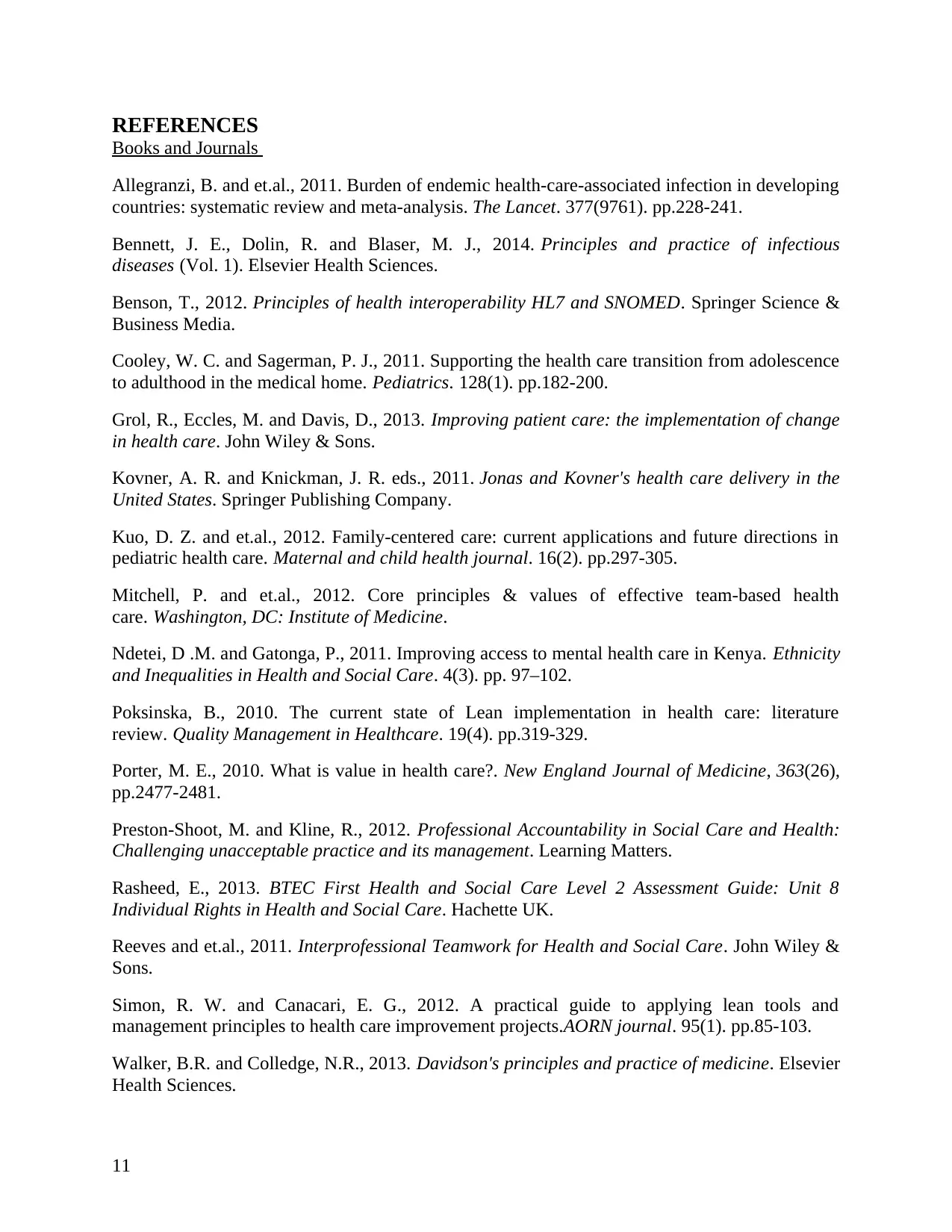
REFERENCES
Books and Journals
Allegranzi, B. and et.al., 2011. Burden of endemic health-care-associated infection in developing
countries: systematic review and meta-analysis. The Lancet. 377(9761). pp.228-241.
Bennett, J. E., Dolin, R. and Blaser, M. J., 2014. Principles and practice of infectious
diseases (Vol. 1). Elsevier Health Sciences.
Benson, T., 2012. Principles of health interoperability HL7 and SNOMED. Springer Science &
Business Media.
Cooley, W. C. and Sagerman, P. J., 2011. Supporting the health care transition from adolescence
to adulthood in the medical home. Pediatrics. 128(1). pp.182-200.
Grol, R., Eccles, M. and Davis, D., 2013. Improving patient care: the implementation of change
in health care. John Wiley & Sons.
Kovner, A. R. and Knickman, J. R. eds., 2011. Jonas and Kovner's health care delivery in the
United States. Springer Publishing Company.
Kuo, D. Z. and et.al., 2012. Family-centered care: current applications and future directions in
pediatric health care. Maternal and child health journal. 16(2). pp.297-305.
Mitchell, P. and et.al., 2012. Core principles & values of effective team-based health
care. Washington, DC: Institute of Medicine.
Ndetei, D .M. and Gatonga, P., 2011. Improving access to mental health care in Kenya. Ethnicity
and Inequalities in Health and Social Care. 4(3). pp. 97–102.
Poksinska, B., 2010. The current state of Lean implementation in health care: literature
review. Quality Management in Healthcare. 19(4). pp.319-329.
Porter, M. E., 2010. What is value in health care?. New England Journal of Medicine, 363(26),
pp.2477-2481.
Preston-Shoot, M. and Kline, R., 2012. Professional Accountability in Social Care and Health:
Challenging unacceptable practice and its management. Learning Matters.
Rasheed, E., 2013. BTEC First Health and Social Care Level 2 Assessment Guide: Unit 8
Individual Rights in Health and Social Care. Hachette UK.
Reeves and et.al., 2011. Interprofessional Teamwork for Health and Social Care. John Wiley &
Sons.
Simon, R. W. and Canacari, E. G., 2012. A practical guide to applying lean tools and
management principles to health care improvement projects.AORN journal. 95(1). pp.85-103.
Walker, B.R. and Colledge, N.R., 2013. Davidson's principles and practice of medicine. Elsevier
Health Sciences.
11
Books and Journals
Allegranzi, B. and et.al., 2011. Burden of endemic health-care-associated infection in developing
countries: systematic review and meta-analysis. The Lancet. 377(9761). pp.228-241.
Bennett, J. E., Dolin, R. and Blaser, M. J., 2014. Principles and practice of infectious
diseases (Vol. 1). Elsevier Health Sciences.
Benson, T., 2012. Principles of health interoperability HL7 and SNOMED. Springer Science &
Business Media.
Cooley, W. C. and Sagerman, P. J., 2011. Supporting the health care transition from adolescence
to adulthood in the medical home. Pediatrics. 128(1). pp.182-200.
Grol, R., Eccles, M. and Davis, D., 2013. Improving patient care: the implementation of change
in health care. John Wiley & Sons.
Kovner, A. R. and Knickman, J. R. eds., 2011. Jonas and Kovner's health care delivery in the
United States. Springer Publishing Company.
Kuo, D. Z. and et.al., 2012. Family-centered care: current applications and future directions in
pediatric health care. Maternal and child health journal. 16(2). pp.297-305.
Mitchell, P. and et.al., 2012. Core principles & values of effective team-based health
care. Washington, DC: Institute of Medicine.
Ndetei, D .M. and Gatonga, P., 2011. Improving access to mental health care in Kenya. Ethnicity
and Inequalities in Health and Social Care. 4(3). pp. 97–102.
Poksinska, B., 2010. The current state of Lean implementation in health care: literature
review. Quality Management in Healthcare. 19(4). pp.319-329.
Porter, M. E., 2010. What is value in health care?. New England Journal of Medicine, 363(26),
pp.2477-2481.
Preston-Shoot, M. and Kline, R., 2012. Professional Accountability in Social Care and Health:
Challenging unacceptable practice and its management. Learning Matters.
Rasheed, E., 2013. BTEC First Health and Social Care Level 2 Assessment Guide: Unit 8
Individual Rights in Health and Social Care. Hachette UK.
Reeves and et.al., 2011. Interprofessional Teamwork for Health and Social Care. John Wiley &
Sons.
Simon, R. W. and Canacari, E. G., 2012. A practical guide to applying lean tools and
management principles to health care improvement projects.AORN journal. 95(1). pp.85-103.
Walker, B.R. and Colledge, N.R., 2013. Davidson's principles and practice of medicine. Elsevier
Health Sciences.
11
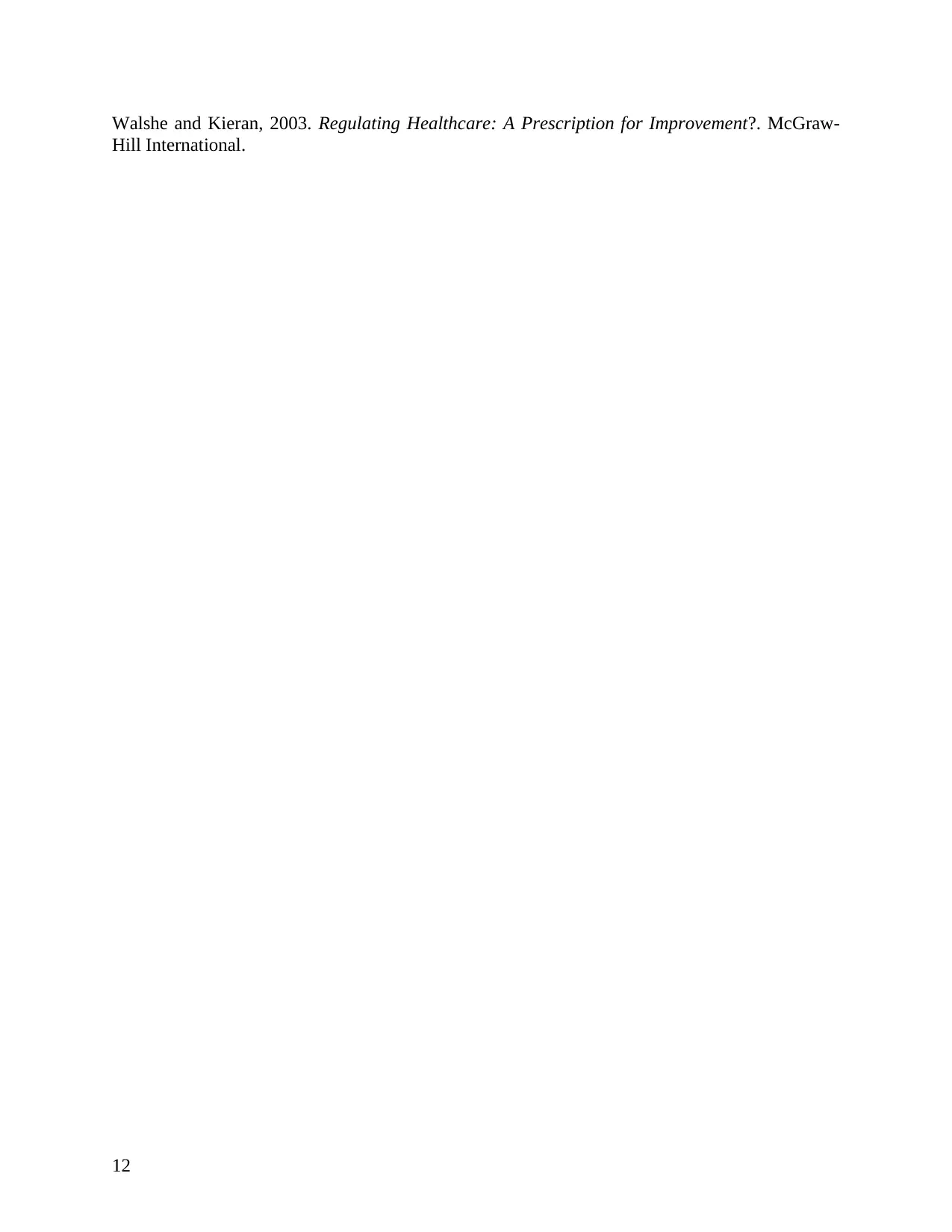
Walshe and Kieran, 2003. Regulating Healthcare: A Prescription for Improvement?. McGraw-
Hill International.
12
Hill International.
12
⊘ This is a preview!⊘
Do you want full access?
Subscribe today to unlock all pages.

Trusted by 1+ million students worldwide
1 out of 12
Related Documents
Your All-in-One AI-Powered Toolkit for Academic Success.
+13062052269
info@desklib.com
Available 24*7 on WhatsApp / Email
![[object Object]](/_next/static/media/star-bottom.7253800d.svg)
Unlock your academic potential
Copyright © 2020–2026 A2Z Services. All Rights Reserved. Developed and managed by ZUCOL.





